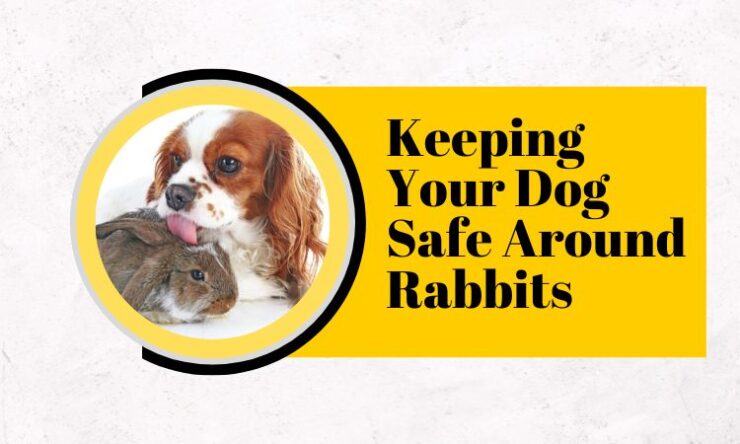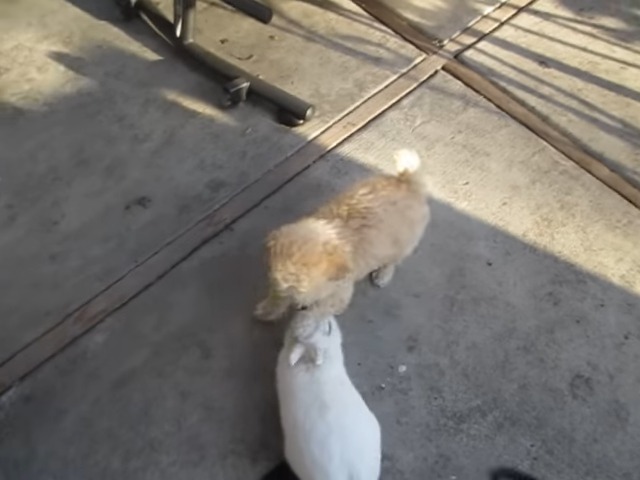This is a common complaint that I hear from pet owners! It is important to note that eating rabbit droppings does not mean that your dog has a dietary deficiency; it’s just a gross habit.
In addition, the types of parasites that rabbits can pass in their stool, do not cause infections in dogs.
Veterinarians will sometimes see evidence that a dog has been eating rabbit droppings by finding the parasite, coccidia, in the stool. The rabbit form of coccidia doesn’t cause harm to the dog and simply passes through the intestinal tract.
There is a dog form of coccidia that can cause infection and then diarrhea. Skilled veterinary technicians are able to distinguish the difference between rabbit coccidia and dog coccidia.
Dogs can get parasites from rabbits however if they eat the entire rabbit. Rabbits can carry tapeworms, and the cysts of the tapeworm can be embedded in the muscle tissue of the rabbit.
If your dog has eaten a rabbit, your veterinarian will likely recommend that your dog receive a tapeworm dewormer.
| Topic | Description | Tips/Recommendations |
|---|---|---|
| Supervision | Ensuring your dog’s safety around rabbits involves careful monitoring of their interactions. | Always supervise your dog when in the presence of rabbits. Never leave them unattended together. |
| Training | Training your dog to behave around rabbits is crucial to prevent chasing, aggressive behavior, or accidental harm. | Teach your dog basic obedience commands, such as “sit,” “stay,” and “leave it.” Reward calm behavior around rabbits. Consider professional training if necessary. |
| Socialization | Early socialization helps your dog learn how to interact appropriately with rabbits and other animals. | Expose your dog to rabbits and other animals from a young age in a controlled environment. Encourage positive interactions and reward calm behavior. |
| Secure environment | Providing a secure environment for both your dog and the rabbits will help keep everyone safe. | Ensure rabbits have a secure, enclosed area, such as a hutch or pen, and that your dog cannot access it. Create a separate space for your dog to play and exercise without the risk of encountering rabbits. |
| Leash control | Keeping your dog on a leash during walks or outdoor activities can help prevent them from chasing rabbits. | Use a leash, harness, or secure fencing to control your dog’s movements when in areas with rabbits. Reinforce the “leave it” command when they show interest in rabbits. |
| Parasite prevention | Ensuring your dog is protected against parasites that can be transmitted from rabbits is essential for their safety. | Keep your dog up-to-date on vaccinations and parasite prevention medications. Regularly clean the rabbit enclosure and keep your dog’s environment clean as well. |
| Health monitoring | Regularly monitoring your dog’s health can help identify any issues related to contact with rabbits, such as parasites, injuries, or illnesses. | Schedule regular veterinary check-ups and report any unusual behavior or symptoms to your veterinarian. |
| Mental and physical stimulation | Providing your dog with mental and physical stimulation can help reduce the likelihood of them developing unwanted behaviors around rabbits, such as chasing or excessive interest. | Engage your dog in regular exercise and play. Use interactive toys and puzzles to provide mental stimulation. Encourage activities that do not involve rabbits or their environment. |
Why do dogs eat rabbit poop?
Dogs may eat rabbit poop for various reasons, some of which are natural instincts, while others may be related to nutritional deficiencies or behavioral issues. Here are a few possible reasons why dogs eat rabbit poop:
- Coprophagia: The act of eating feces, known as coprophagia, is a common behavior in dogs. Ingesting feces can be an instinctive behavior that traces back to their ancestors, who would eat feces to eliminate any traces of their presence, which could attract predators or competitors.
- Nutritional content: Rabbit feces contain undigested plant material and can be a source of nutrients, such as B vitamins and fiber. Dogs may be attracted to the scent or taste of these nutrients, especially if their diet is lacking in certain components.
- Scavenging behavior: Dogs are natural scavengers, and their sense of smell is much more powerful than ours. They may be attracted to the strong scent of rabbit poop and, upon investigation, may decide to eat it.
- Curiosity: Dogs are curious animals, and they often explore their environment using their mouths. It is possible that they may eat rabbit poop out of curiosity, simply to explore the taste and texture of the new substance.
- Boredom or stress: Some dogs may develop behaviors like eating rabbit poop due to boredom or stress. Providing mental and physical stimulation through exercise, play, and interactive toys can help reduce the likelihood of such behaviors.
- Medical issues: In some cases, dogs may eat rabbit poop due to an underlying medical issue, such as malabsorption or gastrointestinal problems. If your dog consistently eats rabbit feces or other non-food items, consult your veterinarian to rule out any health issues.
Rabbits can also carry fleas and ticks. Not only could your dog potentially get fleas or ticks from the rabbit if he came into contact with it, but these parasites can carry two very serious bacteria: Tularemia and the plague!
Tularemia is caused by a bacteria called francisella tularensis.
Dogs can get infected with Tularemia either by eating a rabbit, or by coming into contact with a tick that has recently fed on a rabbit.
Humans can also get Tularemia from rabbits. Tularemia is found in Minnesota, but luckily there have only been 5 reported cases in the last 10 years.
A patient with Tularemia will exhibit flu like symptoms including poor appetite, fever and enlarged lymph nodes.
Rabbits can also carry the Plague! Yes, the same bubonic plaque that wiped out 30 to 50 percent of the population of Europe in the 14th century thus causing a massive labor shortage and changing the economic and political structure of modern societies permanently!
Luckily, there has never been a reported case of plague in humans in Minnesota. (The nearest human plague case was in Illinois). Plague is still present, however, in the lower western United States.
According to the CDC, about 5-15 people contract the plague every year in the United States. Plague is spread by fleas.
When a flea bites its victim, it can spread the plague bacteria, yersinia pestis. Symptoms include fever, chills, swollen lymph nodes and sometimes death.
Ingesting rabbit droppings can potentially lead to health problems for your dog, including digestive issues and the transmission of parasites or diseases.
While hydrogen peroxide may have some cleaning properties, it’s not recommended as a solution for this situation.
Instead, it’s best to regularly clean up your yard to minimize the amount of rabbit droppings that your dog has access to and to provide them with a balanced diet to support their overall health.
If you have concerns about your dog’s health, it’s best to consult with a veterinarian.
In short, rabbit droppings won’t harm your dog, but they are a clear signal that rabbits are visiting your environment, and making sure that your dog is protected with a flea and tick product and discouraged from hunting rabbits, is a good idea.














